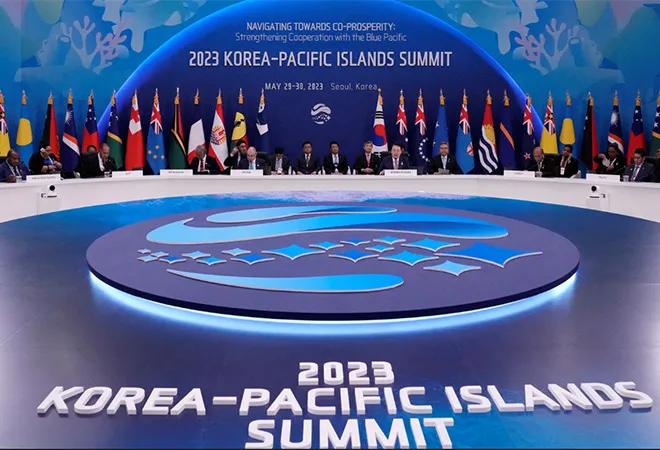-
CENTRES
Progammes & Centres
Location
In light of the growing focus on the Pacific region, South Korea, alongside other nations, has ramped up bilateral ties with PICs by boosting development and security cooperation

Seoul hosted the first Korea-Pacific Islands Summit on 29 May 2023. Co-chaired by President Yoon Suk Yeol of the Republic of Korea and Prime Minister Mark Brown of the Cook Islands, the Chair of the Pacific Islands Forum (PIF), the Summit was attended by Pacific Islands Forum leaders and representatives as well as the Secretary General of the PIF, Henry Puna. The theme of the Summit was ‘Navigating towards Co-Prosperity: Strengthening Cooperation with the Blue Pacific’ and the discussions revolved around “matters of shared cooperation”, i.e., ways and means to further enhance collaboration on areas ranging from sustainable development, climate change, environment, disaster risk, and resilience; maritime affairs, fisheries, people-to-people exchanges, and other matters of mutual interest. The primary aim of the meeting was to “expand the nexus between the 2050 Strategy for the Blue Pacific Continent and Korea’s Indo-Pacific Strategy between the Pacific Islands Forum and Korea, as key partners to effectively address global challenges and co-prosper.” Korea even proposed an action plan to help implement this and provide development assistance to the Pacific Islands. The action plan focuses on “Resilience, Reinforcement, and Revitalisation”. In other words, the focus will be on strengthening climate and disaster resilience for a sustainable future; capacity-building of the Pacific Island countries, and reinvigorating connectivity in the post-COVID-19 period.
Ever since the Yoon administration took charge in May 2022, the government has begun an active outreach programme to deepen engagement with countries in the Indo-Pacific region. In the Indo-Pacific Strategy released by Seoul in December 2022, it has been clearly stated that “Korea is increasing the engagement with the Pacific Island Countries with whom Korea shares the Pacific Ocean.” Therefore, boosting development and security cooperation were two key aspects of deliberation at this Summit, both of which are mutually important for Seoul and the island nations.
The primary aim of the meeting was to “expand the nexus between the 2050 Strategy for the Blue Pacific Continent and Korea’s Indo-Pacific Strategy between the Pacific Islands Forum and Korea, as key partners to effectively address global challenges and co-prosper.”
Seoul has been a dialogue partner of the PIF and has maintained cooperation since 2011 via the Korea-Pacific Islands Foreign Ministers' Meeting. Korea’s engagement through the ROK-PIF Cooperation Fund initiated in 2008 has focused on areas such as infrastructure development, healthcare, education, renewable energy, and agriculture and has strengthened Korea's standing as a reliable partner in the region. Additionally, Korea has also been investing by providing concessional loans through the Economic Development Cooperation Fund (ECDF) for infrastructure development in the Pacific Island countries, like the port construction project in Papua New Guinea (PNG). As per the action plan released at the end of this meeting, Korea is also looking to double the scale of official development assistance (ODA) to US$ 39.9 million to Pacific Island countries by 2027 and design ‘customised projects for cooperation’ with the Pacific Island countries. Korea's engagement with the PICs is strategically important in terms of their geographic location and abundant natural resources, the preservation of which aligns with the latter’s broader goals of promoting sustainable development, addressing climate change, and fostering regional stability. Given the vulnerability of these nations to rising sea levels and extreme weather events, Korea has extended support through initiatives such as the Green Climate Fund and the Global Green Growth Institute. These efforts aim to assist the PICs in adapting to climate change, promoting sustainable development, and transitioning to low-carbon economies. The theme of the Summit in May, therefore, sought to widen and deepen the scope of Seoul’s engagement in these areas.
But Seoul’s engagement with the PICs has been largely limited to developmental assistance. This is because traditionally, South Korea’s role has been largely confined to the peninsular region for three key reasons. First, the unpredictability and volatility of Pyongyang and the rising threat posed by its nuclear programme; second, a historically tenuous relationship with Japan which has prevented these two geographically proximate neighbours from working together closely; and third, a degree of dependence on China which resulted in reluctance regarding overt participation in the dominant narratives and cooperation platforms in the Indo-Pacific.
Korea's engagement with the PICs is strategically important in terms of their geographic location and abundant natural resources, the preservation of which aligns with the latter’s broader goals of promoting sustainable development, addressing climate change, and fostering regional stability.
The Foreign Ministers' Meeting was upgraded to summit level at the last meeting in October 2022, signalling the beginning of a change in Seoul’s approach—one that is keen on undertaking more measurable steps toward strengthening ties. Together with other recent developments such as the adoption of its own Indo-Pacific strategy, visible efforts at improving ties with Japan, and a clear official message about the country’s intent to engage with the wider region demonstrates the continuity in the foreign policy outreach by the Yoon government.
The Pacific Island countries have seen a host of summits and meetings in the last month with the United States (US)-Pacific Islands Forum Leaders’ Dialogue and the Forum for India-Pacific Islands Cooperation. India in its meeting promised to work towards improving trade ties and development assistance. The US Secretary of State, Antony Blinken signed a Defence Agreement with PNG after the meeting. Even in the Quad Leaders’ joint statement released after the meeting in Hiroshima, Japan, the Pacific Islands Forum (PIF) did find a mention and the need to work more closely with the PIF was also laid out. With the proactiveness from the part of India, Japan, and Korea, it does reflect that these countries are upping their game in the Pacific. The Quad statement shows that these players will also get much-needed support from countries like the US and Australia, who have been the primary players in this region along with New Zealand. The Korea-Pacific Islands Summit was also attended by the Australian Defence Minister, Richard Marles.
The Quad statement shows that these players will also get much-needed support from countries like the US and Australia, who have been the primary players in this region along with New Zealand.
The fact that the Pacific is getting so much attention and is becoming a focus area in the Indo-Pacific strategies of countries is indeed a good thing, but the approach needs to be a carefully tailored one. The diplomacy approach followed by the Pacific Island nations has been of inclusiveness and collective action, and this is reflected in the 2050 Strategy for the Blue Pacific Continent in itself. This strategy is described as, “guiding the region’s decision-making process and collective action. The region must keep building consensus amongst ourselves and with our partners. It is the region’s collective voice and blueprint for addressing the region’s challenges. It is built on the Pacific’s long history of working together.” The boost in engagement with the Pacific Island nations cannot be just guided by China’s growing influence, economic leverage, and security ambitions in this region. In fact, there are also reports that the Solomon Islands did not completely endorse the Declaration of the Korea-Pacific Islands Summit as they felt that there should not be any “competing strategy” that contradicts the spirit of regionalism articulated in the 2050 Strategy. The statement by the Solomon Islands Prime Minister, Manasseh Sogavare read, “Solomon Islands maintains its position of not supporting any policy or groups that targets a third country.” The Pacific Island countries are mostly looking at cooperating on non-traditional security issues like economic recovery and access to finance; climate change and disaster risk and resilience; ocean governance, maritime affairs, and fisheries; and people-to-people exchanges.
The diplomacy approach followed by the Pacific Island nations has been of inclusiveness and collective action, and this is reflected in the 2050 Strategy for the Blue Pacific Continent in itself.
The Pacific countries have expressed their displeasure with the strategic competition playing out in their region and are also very cautious about not choosing any sides in this scenario. For them, Korea is another partner taking note of their concerns and is looking to work with them to address these concerns. Joanne Wallis, a Professor of International Security at the University of Adelaide and Jiye Kim, an Assistant Professor at Ritsumeikan Asia Pacific University note that South Korea, despite being a US ally, adopts a ‘flexible diplomacy’ approach and talks about inclusiveness in its Indo-Pacific strategy, so that would play in its favour when dealing with the Pacific Island nations. South Korea is also not very keen to adopt a ‘containment approach’ towards China given their geographical proximity and economic partnership; the same holds true for Pacific Island nations as they also working with China on a development partnership. Therefore, all seems to be falling in place and South Korea does seem like an attractive partner at the moment. Still, with so many countries—South Korea, Japan, and India—ramping up their Pacific diplomacy in addition to the US, Australia, and New Zealand, efforts need to be made to ensure that these approaches and initiatives align and do not appear to contradict one another. These also need to appear as initiatives aimed at championing the interests of the Pacific countries and not targeting any third nation. It seems that the external players do want to work together as is reflected in comments and statements from the top leaders of these countries, so if there would be any joint initiatives or just bilateral ones remains to be seen.
Premesha Saha is a Fellow with the Strategic Studies Programme at the Observer Research Foundation
Pratnashree Basu is an Associate Fellow with the Centre for New Economic Diplomacy at the Observer Research Foundation
The views expressed above belong to the author(s). ORF research and analyses now available on Telegram! Click here to access our curated content — blogs, longforms and interviews.

Pratnashree Basu is an Associate Fellow with the Strategic Studies Programme. She covers the Indo-Pacific region, with a focus on Japan’s role in the region. ...
Read More +
Premesha Saha was a Fellow with ORF’s Strategic Studies Programme. Her research focuses on Southeast Asia, East Asia, Oceania and the emerging dynamics of the ...
Read More +